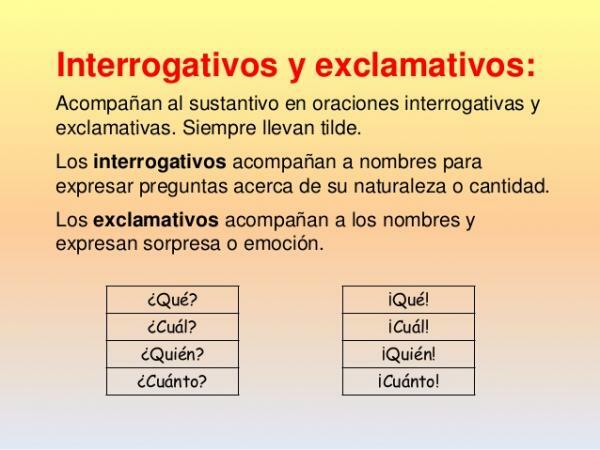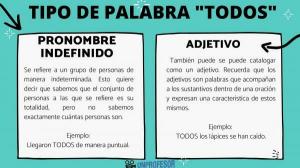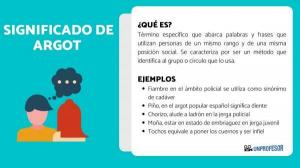What are the interrogative and exclamatory words

When expressing ourselves in Spanish we use different sentences. Depending on what we want to express we will use one or the other. In them we can point out some of the most important, which would be affirmative, negative, interrogative and exclamatory sentences. The last two serve to ask and express emotions on the part of the sender and use a series of particles that help to identify them. In this lesson from a TEACHER we will see what are the interrogative and exclamatory words, plus some examples so you can get to know them easily.
In order to explain the interrogative and exclamatory words we must start from their context, that is, when they are used and in what type of sentences. In this specific case, these particles are used in interrogative and exclamatory sentences that together with them and the punctuation marks that accompany them help the reader to identify them. In the case of oral expression, its identification will be made solely and exclusively by the tone of voice of the sender who will ask a question or express an emotion through a statement of the type exclamatory.
What are interrogative sentences
As we have already anticipated, interrogative sentences are always placed between two punctuation marks called interrogations. Specifically in Spanish, both are always used, the opening (¿) and the closing (?). These can also have different modalities, that is, they can be direct or indirect questions. The second of them do not carry questions, but we can also come to recognize them because the question is implicit in the sentence. We will also have other clues that will help us to know them, these are none other than the incorporation of the particles or question words which we will talk about later. Some examples of direct question phrases:
- When are you coming?
- Do you plan to do it at some point?
- I don't know what he will do.
- Who knows what will happen.
Exclamation sentences
These sentences are used when the sender of the message wants intensify it, this emphasis mainly appears in oral expression in which the receiver can quickly discover what is the speaker's intention. In the case of written texts, this type of exclamatory sentences that express their state of mind, emotions or feelings, are located between two sexclamation marks that will help you identify them. As with interrogative sentences, they always have an opening sign (¡) and a closing sign (!). Within the exclamatory sentences we can find two types: expressions or those that are directed to a person.
- That awful!
- How wicked!
- You got me fed up!
- How heavy are you!

Image: Maestro San Blas
When constructing interrogative and exclamatory sentences, in addition to exclamation marks and interrogation, it is necessary to add a series of words that will help us make sense of the sentence and easily identify it. These words or particles, although in their natural form are not accentuated, appear with tilde when the intention of the speaker is interrogative or exclamatory. These words are shared in the two types of sentences and are as follows:
- What
- Who
- Which
- When
- How much
- Where
- How
Interrogative words
Usually if these refer to interrogative sentences will appear at the beginning of the phrase. The question words, in addition to the question marks, will help us to easily distinguish these sentences. Let's look at a few examples:
- How did you get here?
- Who is that man?
- How old are you?
- When did you finish your studies?
- What happened?
- Which of all these pens is yours?
- Where are my keys?
Although this is the most normal, question words do not have to always be at the beginning of a sentence. They can also appear in the middle of it. To better understand it, we are going with some examples:
- Do you want to know who her boyfriend is?
- Don't you understand what happened?
- Can you imagine how long it took me to get there?
- Where do you come from at this hour?
- Who do I have to ask to get the certificate?
As we have already pointed out previously, when interrogative sentences are expressed in indirect style we can also identify them thanks to the introduction of these interrogative particles. In any case, despite the fact that they do not have question marks, the interrogative particles are always accented. Here are some examples of indirect question sentences:
- He was eager to know who the murderer was.
- I asked the waiter how much the latte cost.
- His friends did not know where he had been all this time.
- Experts wondered what the proper procedure would be.
- No one could suspect how it really happened.
Exclamatory words
In written texts we can find exclamatory sentences framed by exclamation marks. In general, exclamatory words, as with interrogatives, appear at the beginning of the sentence and always accented. Some examples are the following:
- Who have you thought I am!
- What a wonderful home!
- Where could it be!
- How much does it cost to live in this area!
- How has he done it!
Identifying the interrogative and exclamatory words in a text is very simple since the sentence provides us with many clues. If you want to continue knowing more about Linguistics and Grammar We encourage you to visit one of our sections where you can find more lessons like this one.



